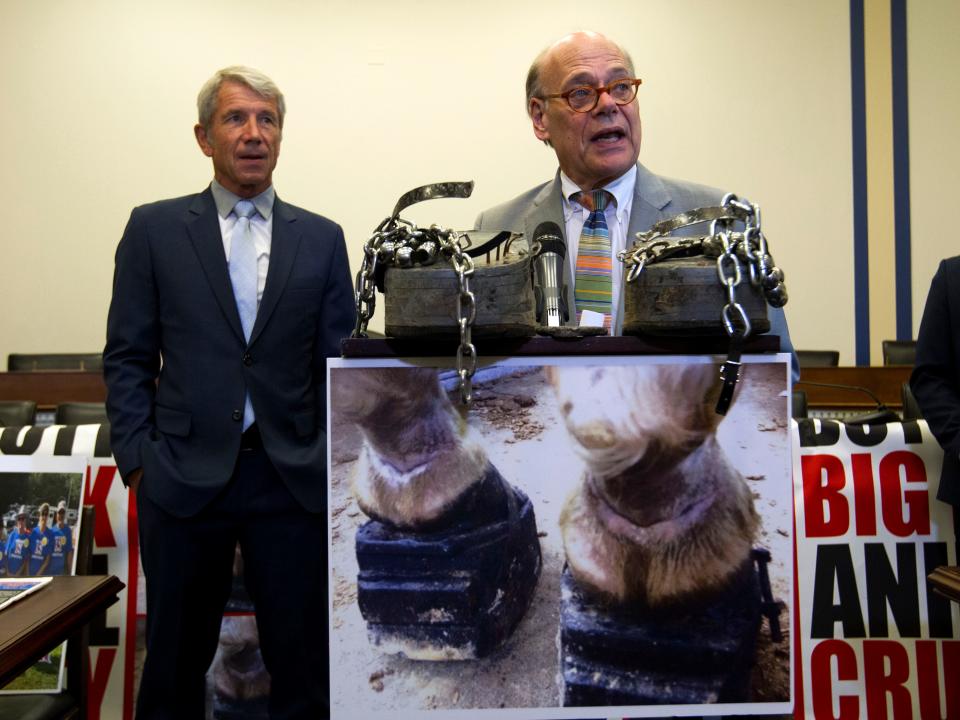There should be no compromise on soring Tennessee walking horses | Opinion
A recent decision by the U.S. Court of Appeals for the District of Columbia Circuit was a milestone in the effort to end the “soring” of Tennessee walking horses and related breeds. The Humane Society of the United States and Humane Society Legislative Fund prevailed in a case challenging the U.S. Department of Agriculture’s abrupt withdrawal in 2017 of a rule to strengthen the agency’s regulations under the Horse Protection Act. The court held that the USDA couldn’t withdraw a rule it had finalized once it was placed for public inspection by the Federal Register.
The 2017 rule ends the failed system of industry self-policing on which the USDA has relied. It bans the use on Tennessee walking and racking horse breeds of devices integral to the soring process.

Ironically, on the very day the decision was announced, a guest column in the Tennessean called for the enactment of federal legislation being touted as a “compromise” to the widely supported Prevent All Soring Tactics (or PAST) Act. That compromise, if passed, would force USDA to undo the reforms of the rule, once implemented.
We should reject it. PAST (H.R. 5441/S. 2295) is cosponsored by a bipartisan majority in the U.S. House and Senate. It passed the House by an overwhelming 333-96 vote in 2019, passed the Senate Commerce Committee by voice vote in 2014, and passed the House Energy and Commerce Committee by a vote of 22-0 in June. It’s endorsed by hundreds of groups in the animal welfare, veterinary, law enforcement and horse industry spaces – including many walking horse organizations. It would accomplish everything the USDA rule contains and then some, including implementation of stiff penalties and making the act of soring illegal.
The “compromise,” negotiated with “leaders in the walking horse breed,” does none of these things. In fact, it would codify industry self-policing and mandate an inspection protocol designed to make it difficult, if not impossible, for soring violations to be cited or prosecuted. It would leave in place the use of devices that are part of the soring process, including platform horseshoes that can hide painful damage inflicted on the animals’ soles. That horseshoe is being billed by the proponents as an “easily removable shoe”; problem is, there’s no such thing. All horseshoes are removable, but none exist that can be popped off and put back on within the limited time available for inspections at horse shows.
Hear more Tennessee voices: Get the weekly opinion newsletter for insightful and thought-provoking columns.
To understand the motivation of the industry “leaders” at the bargaining table, let’s examine their track records.
The Tennessee Walking Horse Breeders and Exhibitors Association (the breed registry) has allowed individuals with histories of federal disqualifications for alleged HPA violations to serve in key leadership positions. They’ve consistently rewarded trainers, breeders and owners with awards for horses who have been sored, and never taken responsibility for the breed’s horse show rules, judge licensing or HPA enforcement – but now suddenly want to play a major role in doing so.
Then there’s the Tennessee Walking Horse National Celebration, which operates the largest USDA-certified Horse Industry Organization involved in the industry’s current enforcement scheme. For decades this group has demonstrated a poor rate of detection of HPA violations, as documented by the USDA. The HIO has no meaningful penalties for violators and even sued the USDA over a rule mandating minimum penalties (and won, on appeal). They have licensed (and the Celebration has hired) alleged horse sorers as judges, who have consistently rewarded trainers who have served, or are about to serve, long federal disqualifications for alleged HPA violations.

Your state. Your stories. Support more reporting like this.
A subscription gives you unlimited access to stories across Tennessee that make a difference in your life and the lives of those around you. Click here to become a subscriber.
Under the proposed compromise, these groups would nominate directors of a new organization that would oversee not only HPA enforcement, but all horse show rules and judge licensing for the entire walking horse breed.
We know these organizations will seek to perpetuate soring because that’s what they’ve been doing for years. Their compromise is a Trojan horse gambit to short-circuit the momentum gathering in Congress and once again in the regulatory sector. The PAST Act and tougher regulations are the only solutions to close the loopholes that have allowed soring to continue – precisely why they oppose them, and all the more reason for Congress to pass the real deal this year.
Keith Dane is the senior director on equine protection at the Humane Society of the United States, a lifelong horseman and former director of the Tennessee Walking Horse Breeders and Exhibitors Association.
This article originally appeared on Nashville Tennessean: There should be no compromise on soring Tennessee walking horses

